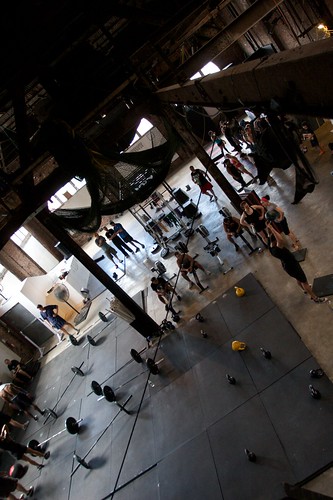
I don't really consider myself a "business person" despite the fact that I've owned and operated a relatively successful small business for almost seven years. As with so many others, I got into this profession because I love coaching movement and facilitating the positive impacts it has on peoples’ lives. I knew from very early on as a coach that I wanted to have my own gym, that I wanted it to be something special, and that having fun would be more important than making money. That being said, I didn't really have the money to start a "proper" business from Day One so I had to do it the old-fashioned way and grow it organically. Below are the two concepts that have essentially encompassed CFSBK’s entire business plan from the early days in the park up through today.
 Plant a Seed and Let it Grow Organically
Plant a Seed and Let it Grow Organically
Back in 2007, when I wanted to start CFSBK, it didn’t seem like the smartest approach to find partners, take out a huge loan, and rent some ludicrously overpriced real estate in Brooklyn in order to start a gym based around a niche training concept that no one had heard of. My entire "financial plan" was to simply work to my best abilities within the resources I had and to never spend a single dollar I didn't already have available. My rule was that if I didn't have the funds to obtain something I needed, I would have to work harder with what I did have until I was able to afford it. So in late 2007 I found a playground near my apartment that had some pull-up bars. I purchased a set of gymnastics rings, one kettlebell, a few cheap jump ropes, and made some sand bags out of truck tire tubes and hose clamps (which we still have and use). My entire initial business investment was somewhere around $150 worth of equipment plus the then $500 CrossFit affiliation fee.
While all this was happening, I continued to work six days a week at a commercial gym in Manhattan to support myself and saved every dollar I made from CrossFit so that I could plug it back into the business. Over time I had enough of a following that I could afford rented space a few times a week and offer a whopping three classes per week. I slowly grew the gym and transitioned myself away from coaching at the commercial facility until my business could sustain first myself, then a gradually growing number of employees. I've maintained that same exact business model and strategy up through today where we have over 600 members and about 20 employees. I take great pride in the fact that my staff and I have "earned" every single component related to our business, which makes every new piece of equipment or aspect of expansion that much more special, not just for me, but for everyone who’s been around long enough to see our growth.
Of course, there are countless alternative approaches to starting an affiliate that could easily bear as much fruit. My point is that many of the financial obstacles which scare off potential gym owners can be completely circumvented as long as you understand the financial rules you're willing to play by, are prepared to take the long road of trading instant gratification for earned experience, and always focus growth on elevating your member experience, not your bottom line.
 Leverage your Coaching and Atmosphere
Leverage your Coaching and Atmosphere
There was recently a thread on the CrossFit message board that posed the question of whether it's possible for an affiliate to start in a park or garage and remain competitive enough to stay afloat, given the ever-growing number of affiliates opening their doors with massive spaces fully equipped to run huge classes and offer a variety of specialized programs. Suddenly the vision of your members throwing sand-filled basketballs at trees for wall balls seems less romantic and more deflating. I was very fortunate to have heard of CrossFit early on and been the only affiliate in Brooklyn for the first year or so I was around. But while the game has changed a bit, nothing will ever trump quality coaching and a commitment to your members. Without fancy amenities to woo your potential clientele, you'll have to again focus on the resources that you do have—which is you—by constantly working to expand your own experience and knowledge. While a fleet of rowing machines, daycare options, and an expansive class schedule certainly are desirable and can be things we should aspire toward, remember that what really stays with people are the interactions they have with the coaches and people around them.
 We’ve talked a lot on ITA about the importance of building community at affiliates and how to create a safe, positive training culture. Part of CFSBK’s business philosophy acknowledges that there is a psycho-social element of fitness, and doing CrossFit isn’t always just about getting fit, but about meeting people and doing things that make you the best version of yourself on all levels. These things are important for a tribe to build community and togetherness. Having an environment that encourages this creates a deeper connection to the program and a deeper relationship to one’s training. This kind of community engagement in turn encourages retention—the more people you know, the more people who will notice you’re not in class. Especially in New York, it’s easy to be alone in a crowd and though we have eight million-plus people, it’s often hard to meet each another. So if your members are clearly having fun and getting better, you're doing your job and should stay the course. There isn't a pro shop in the world that trumps the feeling of someone at your affiliate being accepted for who they are, and being challenged to get better.
We’ve talked a lot on ITA about the importance of building community at affiliates and how to create a safe, positive training culture. Part of CFSBK’s business philosophy acknowledges that there is a psycho-social element of fitness, and doing CrossFit isn’t always just about getting fit, but about meeting people and doing things that make you the best version of yourself on all levels. These things are important for a tribe to build community and togetherness. Having an environment that encourages this creates a deeper connection to the program and a deeper relationship to one’s training. This kind of community engagement in turn encourages retention—the more people you know, the more people who will notice you’re not in class. Especially in New York, it’s easy to be alone in a crowd and though we have eight million-plus people, it’s often hard to meet each another. So if your members are clearly having fun and getting better, you're doing your job and should stay the course. There isn't a pro shop in the world that trumps the feeling of someone at your affiliate being accepted for who they are, and being challenged to get better.
Concluding Thoughts
The CrossFit affiliate model is a very rare business system and is not something to take for granted. While the explosive growth of CrossFit has quite expectedly led to some quality-control issues, I still completely appreciate the freedom I've been given to express and grow my business exactly as I see fit. Without the freedom to start small and grow organically, my life would have been completely different and I'm sure much less fulfilling. If you're interested in starting an affiliate, remember that you can still start small and pave your own road for success. The opportunities are out there; you just need to be dedicated and passionate enough to take advantage of them.